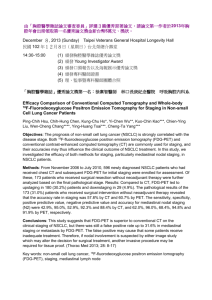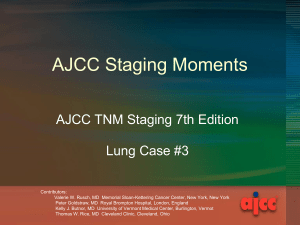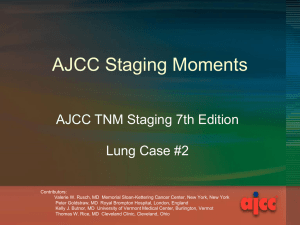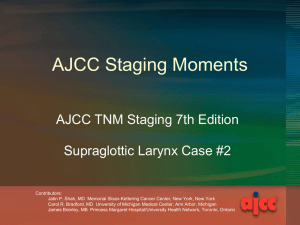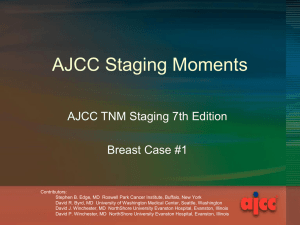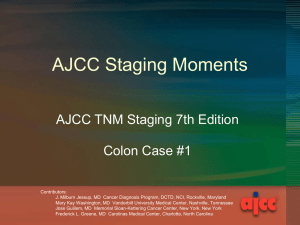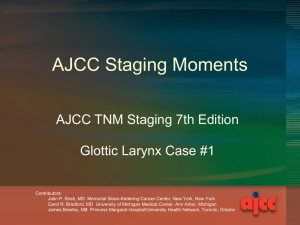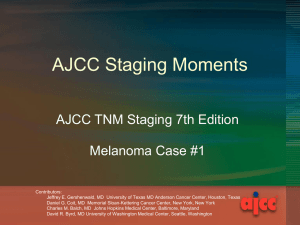Staging Moments Lung Case 1
advertisement
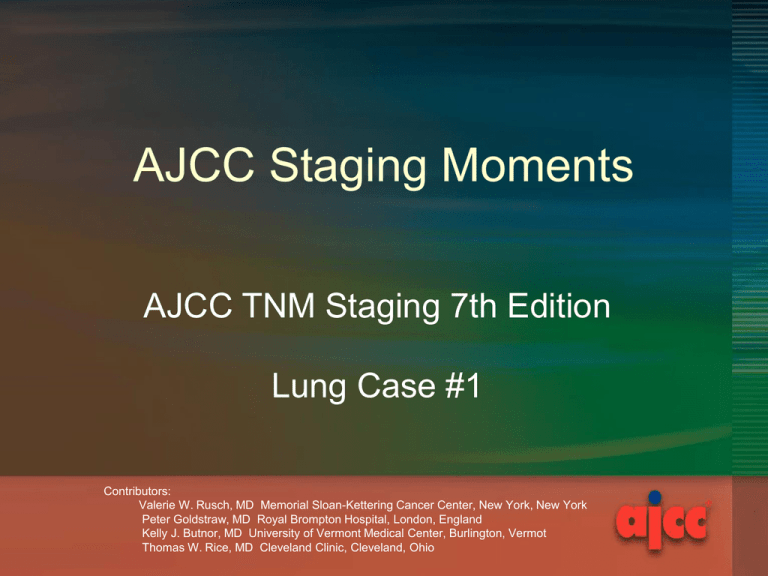
AJCC Staging Moments AJCC TNM Staging 7th Edition Lung Case #1 Contributors: Valerie W. Rusch, MD Memorial Sloan-Kettering Cancer Center, New York, New York Peter Goldstraw, MD Royal Brompton Hospital, London, England Kelly J. Butnor, MD University of Vermont Medical Center, Burlington, Vermot Thomas W. Rice, MD Cleveland Clinic, Cleveland, Ohio Lung Case # 1 Presentation of New Case • Newly diagnosed lung cancer patient • Presentation at Cancer Conference for treatment recommendations and clinical staging Lung Case # 1 History & Physical • 75 yr old male who presented with an abnormal CXR during workup for another condition, no symptoms • 50 yr smoking history Lung Case # 1 Imaging Results • Chest x-ray- 1.8cm mass density right lower lobe (RLL) lung • CT chest- 2cm mass RLL lung, no hilar or mediastinal lymphadenopathy Used with permission. Swanson K, Jett J. Atlas of Cancer. Edited by Maurie Markman, David H. Johnson. ©2002 Current Medicine, Inc. • PET/CT- RLL lung nodule with a maximum SUV of 22.7, suspicious for lung malignancy; there was no evidence of distant disease Lung Case # 1 Diagnostic Procedure • Procedure – CT guided biopsy RLL lung • Pathology Report – Adenocarcinoma – Grade 2 Lung Case # 1 Clinical Staging • Clinical staging – Uses information from the physical exam, imaging, and diagnostic biopsy • Purpose – Select appropriate treatment – Estimate prognosis Lung Case # 1 Clinical Staging • Synopsis- elderly patient with 2cm adenoca lesion, nodes neg on imaging • What is the clinical stage? – – – – T____ N____ M____ Stage Group______ Lung Case # 1 Clinical Staging • Clinical Stage correct answer – – – – T1a N0 M0 Stage Group IA • Based on stage, treatment is selected • Review NCCN treatment guidelines for this stage Lung Case # 1 Clinical Staging • Rationale for staging choices – T1a for ca <2cm – N0 because nodes were clinically negative on imaging – M0 because there was nothing to suggest distant metastases; if there was, appropriate tests would be performed before developing a treatment plan Prognostic Factors Clinically Significant • Applicable to this case – Separate tumor nodules: none • There are no prognostic factors required for staging Lung Case # 1 Presentation after Surgery • The procedure chosen based on the small lesion and clinically negative nodes in an elderly patient, Stage IA, is resection and node sampling • Presentation at Cancer Conference for adjuvant treatment recommendations and pathologic staging Lung Case # 1 Surgery & Findings • Procedure – RLL lobectomy – Hilar & mediastinal node resection • Operative findings – No additional information Lung Case # 1 Pathology Results • • • • • • Adenocarcinoma Size of tumor – 3.4cm Grade - Moderately differentiated Visceral pleural involvement, PL2 Margins negative 4 peribronchial, 1 paraesophageal, 1 paratracheal, and 1 subcarinal nodes negative Lung Case # 1 Pathologic Staging • Pathologic staging – Uses information from the clinical staging supplemented or modified by information from surgery and the pathology report • Purpose – Additional precise data for estimating prognosis – Calculating end results (survival data) Lung Case # 1 Pathologic Staging • Synopsis- patient with 3.4cm adenoca into visceral pleura, PL2, intrapulmonary and mediastinal nodes negative • What is the pathologic stage? (remember, clinical M may be used in pathologic staging) – – – – T____ N____ M____ Stage Group______ Lung Case # 1 Pathologic Staging • Pathologic Stage correct answer – – – – pT2a pN0 cM0 Stage Group IB • Based on pathologic stage, there is more information to estimate prognosis and discuss adjuvant treatment Lung Case # 1 Pathologic Staging • Rationale for staging choices – pT2a based on size and invading the visceral pleura – pN0 because intrapulmonary and mediastinal nodes were negative • 6 nodes/stations should be examined – cM0 - use clinical M with pathologic staging unless there is pathologic confirmation of distant metastases Prognostic Factors Clinically Significant • Applicable to this case – Separate tumor nodules: none – Pleural/elastic layer invasion: PL2 • There are no prognostic factors required for staging AJCC Cancer Staging Atlas T2 >3cm-<7; invades visceral pleura; main bronchus >2cm from carina; lobar atelectasis Lung Case # 1 Recap of Staging • Summary of correct answers – Clinical stage T1a N0 M0 Stage Group IA – Pathologic stage T2a N0 cM0 Stage Group IB • The staging classifications have a different purpose and therefore can be different. Do not go back and change the clinical staging based on pathologic staging information. Staging Moments Summary • Review site-specific information if needed • Clinical Staging – Based on information before treatment – Used to select treatment options • Pathologic Staging – Based on clinical data PLUS surgery and pathology report information – Used to evaluate end-results (survival)

